ONLINE PHOTO COLLECTIONS
The Library of Virginia's Visual Studies collection houses more than 240,000 prints, photographs, postcards, posters and ephemera. Over the years, we have digitized not only parts of our own collections, but also some very interesting local photograph collections housed at public libraries across the commonwealth. As with all of our digital collections, the digital photograph collections are searchable by keyword, creator, and title. Our older digital photographs are managed in our online catalog, and all can be searched simultaneously here.
In addition, our newer digital photograph collections offer thumbnails by which you can browse the collections. These collections can also be searched simultaneously using DigiTool, our new digital asset management system. We are making strides to combine these resources into one place for easier, more thorough searching. Check back periodically to see what's been added!
![[Out for an early morning canter at Virginia Beach, where the air is filled with the tang of the sea], [1939]. 1939 World's Fair Photograph Collection, Special Collections Prints & Photographs, Library of Virginia, Richmond, Va. icon](/docs/WF-02-06-024_thumb.jpg)
1939 World's Fair Photograph Collection
This VCC collection, displayed in the Virginia Room at the 1939 World's Fair in New York City, contains more than 3,000 photographs representing twelve aspects of Virginia life: scenic tours; recreation; historic homes; culture; history; colonial archaeology; scenery and natural wonders; physiography; agriculture; education; government and the people; and industry, commerce, and transportation.
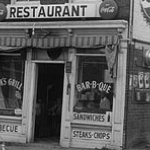
Adolph B. Rice Photograph Collection
The Adolph B. Rice Studio Collection constitutes a unique photographic record of life in Richmond, Virginia, from 1949 to 1961. The Library offers here digital versions of over 400 of the 16,000 images from Rice's commercial studio, covering studio portraits, aerial views, advertising shots for local department stores, and local religious and educational events. This collection is also available on Flickr. If you're familiar with the people, places, and events covered in the Rice Collection, you can add comments and metadata that will help us identify this content even better.

Callahan Photograph Collection, Eastern Shore Public Library
Photographs from the Doran S. Callahan collection depicting scenes from the counties of Accomack and Northampton. Subjects include homes, churches, gravestones, important landmarks, courthouses, and other buildings. 85 photographs taken between 1895 and 1900.
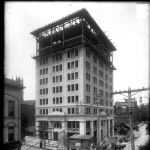
Carneal & Johnston Negative Collection
The Carneal & Johnston digital collection consists of 215 images created from glass-plate negatives documenting some of the many designs created by the Richmond architectural firm, including interior and exterior views of various commercial buildings and private residences designed by the firm. William Leigh Carneal Jr. (1881-1958) and James Markam Ambler Johnston (1885-1974) began their firm about 1908 after spending a year working independently while sharing office space. The firm went on to become one of the most prolific and long-established architectural practices in the state and by 1950 had helped to mold the architectural environment of central Virginia, especially Richmond. Responsible for more than 1,300 buildings, Carneal and Johnston practiced in a wide range of project types, from the mundane to the monumental. Some of the most notable structures represented in the collection include First Virginia Regiment Armory (1913), the Richmond Dairy (1914), the Colonial Theater (1919-1920), the Virginia State Office Building (1922-1923), and various structures on the campuses of Richmond College (now the University of Richmond) and Virginia Military Institute. The collection, purchased at auction by the Library of Virginia Foundation in 2009, complements some of the Library's several Carneal & Johnston architectural drawings and plans related to state government buildings.
Fairfax County Public Library Historical Photographs
The Library of Virginia is pleased to host a new sampling of photographs from the Virginia Room at the Fairfax County Public Library. This collection includes digitized images depicting every day life in the county over a good part of the late 19th and most of the 20th centuries. The photographs and postcard images cover activities & events from all across the county, including the Civil War, and show farms, businesses, schools, churches, and much more. Browse through the entire collection or search to refine your results.
![[Train crossing Alexandria viaduct], ca. 1957. Fairfax County Public Library Photograph Collections (online collection). Library of Virginia, Richmond, VA. icon](/docs/VDLP-Fairfax-railroad-washod_105_thumb.jpg)
Fairfax County Public Library Photograph Collection
Included here are approximately 190 photographs which are part of the Henry H. Douglas Collection of Washington & Old Dominion Railroad Photographs, 300 photographs which illustrated the Fairfax County Extension Service Annual Reports issued between 1922 and 1948, and seven photographs originally published in an article about Joseph Beard in the Washington Star Magazine, April 26, 1953.
Governor Mark R. Warner Administration Photograph Collection
This collection documents the administration of Governor Mark R. Warner (2002-2006). The photographs are a sample of the entire collection transferred to the Library of Virginia in January 2006. As part of the records of the governor's Press Office, the photographs document major accomplishments of the administration; school group and organization visits to the capitol; bill signings; events centered on economic development, education, and transportation; the governor's travels throughout the state, and myriad other topics. Understanding of events is enhanced with other Press Office records that may be viewed in the Archives & Manuscripts Reading Room at the Library of Virginia.
![[Infant in baby dress with dog], [1920]. Hamblin Studio Photograph Collection (online collection). Library of Virginia, Richmond, VA. Part of the Hamblin Photograph Collection housed at the Suffolk Public Library, Suffolk, VA. icon](/docs/VDLP-Suffolk-gp0163_thumb.jpg)
Hamblin Studio Photograph Collection, Suffolk Public Library
1,300 photographs taken by four photographers associated with the Hamblin Studio 1910-1975. Subjects include business, commerce, manufacturing, government, education, religion, social and cultural activities, and African American community life.
![Mitzi Gaynor & Andy Roberts Seafood Festival King & Queen Sep. 14-16, 1950, [1950]. Hampton Historical Collections Photographs (online collection), Library of Virginia, Richmond, VA. icon](/docs/VDLP-Hampton-0380_06_thumb.jpg)
Hampton Public Library/City of Hampton Historical Collection Photographs
1,400 photographs from the Christopher E. Cheyne collection depicting businesses, the seafood industry, the hotel and resort industry, prominent Hampton families, Confederate veterans, and other subjects; taken between 1894 and 1945.

Harry C. Mann Photograph Collection
A fully-searchable index to the Harry C. Mann Photograph Collection of glass plate negatives located in the Visual Studies Collection at the Library of Virginia
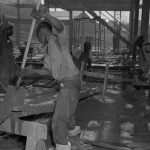
Hopewell Virginia Locals of United Mine Workers of America Photograph Collection
Spanning nearly three decades, this collection includes candid images documenting the growth of an industrial city. This online collection is a small sample of the nearly 4000 negatives and photographs available for research at the Library of Virginia. The prints and photographs in this collection show union officers and proceedings, strikers in action, contract-signing ceremonies, parades and marching bands, racially segregated recreational activities, Labor Day festivities, earth-breaking ceremonies, and construction and completion of Hopewell's Union Hall. Negatives from Hercules Powder Company (ca. 1947--1957) make up the largest measure of this collection and include images of workplace accidents and safety efforts, staff photos, operations and machinery, social clubs, notable visitors, and special events.
Michael Miley Studio Collection
Michael Miley (1841-1918), probably most famous for his portraits of Robert E. Lee, was a Rockbridge County native who contributed greatly to the burgeoning field of photography. In 1866, Miley partnered with businessman John C. Boude to open a photography studio at the corner of Main and Nelson Streets in Lexington. He purchased Boude's half of the business in 1870, named the studio the Stonewall Art Gallery, and found his niche as a portrait photographer. The Library of Virginia has a collection of 58 glass-plate negatives and 12 carte de visites taken in and around Miley's studio in Lexington. Although some of the images have been identified through crowdsourcing projects, most are unidentified. The most notable images in the collection are photographs of the singing group The Charity Nightingales and of the poet Spotswood Styles and his family.
![Hilton Village, Hilton Fire Department, Hilton fire house, Main Street at Warwick in 1937, [1937]. Newport News Public Library Collection (online collection), Library of Virginia, Richmond, VA. icon](/docs/VDLP-Newport-News-181e_thumb.jpg)
Newport News Public Library Photograph Collection
two photographic collections — more than 40 photographs of the Hotel Warwick taken before 1925 which are part of the Old Dominion Land Company Records and more than 230 photographs of Hilton Village taken during the construction phase in 1918 and 1919.

Portsmouth Public Library Photograph Collection
two photographic collections; more than 800 photographs of the Olde Towne historic area depicting homes, churches, streets, commercial structures, and other historic sites and the Lee F. Rodgers collection of approximately 1,500 photographs primarily of African American subjects.
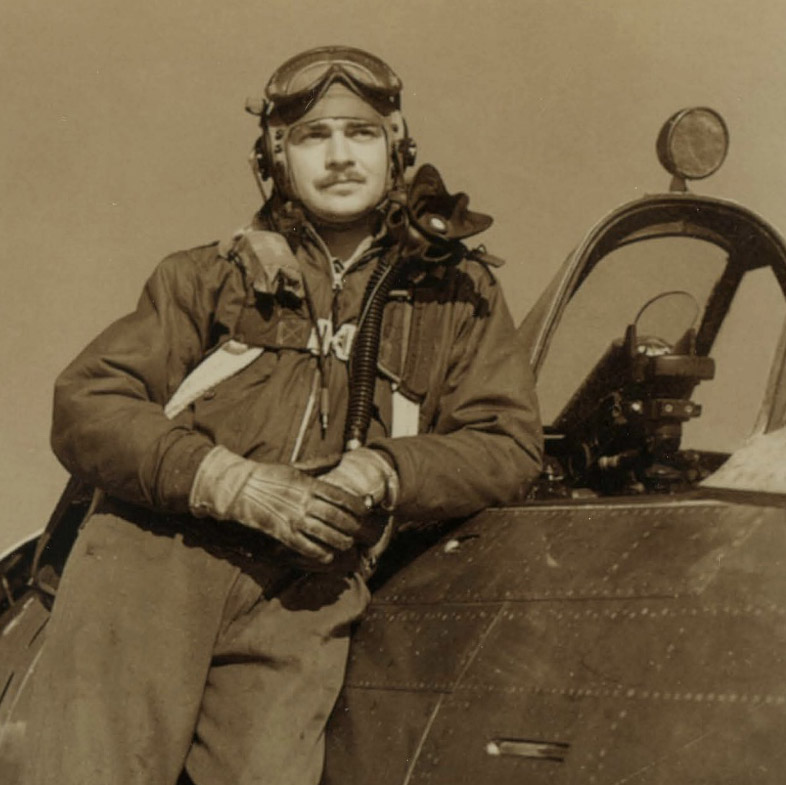
Profiles of Honor
The Profiles of Honor Digital Collection commemorates the service of Virginians in World War I and World War II by preserving digital copies of images and records donated by veterans and their families. Images were digitized during the Profiles of Honor Tour, funded by the Virginia World War I and World War II Commission between 2017-2019.
![Emmett Dudley, [Not after 1915]. Radford Public Library Photograph Collection (online collection). Library of Virginia, Richmond, VA. icon](/docs/VDLP-Radford-61a_thumb.jpg)
Radford Public Library Photograph Collection
Photographs published in The Radford Record Album in 1915. More than 225 photographs depicting residences, commercial and manufacturing buildings, churches, educational institutions, monuments, railroads, community activities, individuals, and views of the New River.
![Reibel. <i>_ Books to Grow on: the Modern World for Young Readers</i>. United States?: [publisher not identified], 1936. Reading & Libraries Poster Collection. icon](/docs/reading_posters_thumb.jpg)
Reading & Libraries Poster Collection
A collection of posters related to books, reading, and libraries. Most of the posters are from the 1920s and 1930s, mostly produced by the American Library Association, the Works Projects Administration, and private artists.
![[Libby Hill Park Neighborhood Survey], 1965. Richmond Esthetic Survey (online collection). Library of Virginia, Richmond, VA. icon](/docs/RES-survey-D009_thumb.jpg)
Richmond Esthetic and Historic Building Survey
An online search engine providing interactive access to maps, photographs, and detailed written survey reports documenting the architecture of central Richmond, Virginia, in 1965. Report, photograph, and map images are available online.

Roanoke County Public Library Local History Photographs
Roanoke County Local History Photograph Collection located in the Local History Room at the Hollins Branch of the Roanoke County Public Library.

School Buildings Service Photographs
a visual record of hundreds of elementary and secondary school buildings across Virginia from the 1920s to the 1970s.
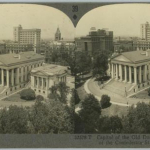
Stereograph Collection
Stereoscopic views were a popular 19th century recreational pastime that enabled photographs to be viewed in three dimensions. What appear to be two identical images adjacent to each other on a cardboard support are actually slightly different. When viewed through the lenses of a stereoscope, they "merge" to form a single 3-D image. The Library of Virginia's Stereograph Collection contains 318 images from many prominent and well-known photographers from the early 1860s to the early 20th century.
![The circus comes to town and elephants parade down Tazewell’s Main Street, [1930]. Tazewell County Public Library Photographs (online collection). Library of Virginia, Richmond, VA. icon](/docs/VDLP-Tazewell-0601a_thumb.jpg)
Tazewell County Public Library Photographs
Photographs originally published in a series of volumes by the Tazewell County Historical Society. Subjects include civic, agricultural, commercial, industrial, educational, social, and religious topics. The nearly 3,900 photographs taken between the late 19th century and the 1960s also include many individuals, families, and groups.
![[The American Red Cross], March 22, 1945. U.S. Army Signal Corps Photograph Collection (online collection). Library of Virginia, Richmond, VA. icon](/docs/VTLS-SC-26-022_thumb.jpg)
U.S. Army Signal Corps Photograph Collection
Photographs from the Hampton Roads Port of Embarkation series, 1942-1946, taken by Army Signal Corps photographers assigned to the port historian's office. The nearly 3,500 photographs depict the arrival and departure of U.S. military personnel and equipment, the preparation and loading of war materials, civilian employees, Red Cross workers, wounded personnel, and German and Italian prisoners of war.

Virginia Chamber of Commerce Photograph Collection
Primarily covering the years 1922–1972, the VCC collection documents a wide range of subjects, including bridges and dams; the cotton, peanut, textile, commercial fishing, and tobacco industries; farming and harvests; the Blue Ridge Parkway and the Skyline Drive; hunting and fishing; and numerous local festivals.
Virginia Czech and Slovak Folklife Festival
The first annual Virginia Czech and Slovak Folklife Festival, sponsored by the Virginia Czech/Slovak Heritage Society, took place on 19 October 2013 at the Prince George County Regional Heritage Center. The Library of Virginia, in partnership with the Society, was present to scan and digitize family documents and photographs documenting the history of the Czech and Slovak families in Virginia.

Virginia Historical Inventory
photographs, maps, and detailed reports documenting the architectural, cultural, and family histories of thousands of 18th– and 19th–century buildings in communities across Virginia. This collection was originally assembled by the Virginia Writers' Project, part of the depression-era Works Progress Administration.

Waynesboro Public Library Photographs
photographs and post cards depicting a variety of subjects from the cities of Waynesboro, Staunton, and Harrisonburg and the surrounding counties of Augusta, Rockingham, and Rockbridge. More than 1,500 photographs and approximately 380 post cards.
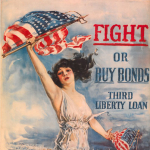
World War I Poster Collection
When the United States entered World War I in 1917, a means of communication was needed to encourage the public to support the war. The Division of Pictorial Publicity enlisted some of the era's finest artists, including Charles Dana Gibson, Howard Chandler Christy, James Montgomery Flagg, Haskell Coffin, and Joseph Christian Leyendecker, to design bold graphic posters to help spread the word. The Library of Virginia's Prints & Photographs Collection includes among its holdings a collection of 44 original World War I posters. Topics illustrated in the collection include enlistment in the armed forces, Liberty Loans and Bonds, and industrial mobilization.
World War II Poster Collection
During World War II, the United States government mobilized the best ad-men available to create posters that would speak to the nation. The themes portrayed played on deep levels of fear, pride, duty, and victory. In order to beat the enemy, citizens were told through posters that they needed to work hard and sacrifice at home. To that end, the ad-men succeeded. People felt as though their efforts at home were truly helping "the boys" overseas. The Library of Virginia's World War II Poster Collection consists of over 400 original posters.


